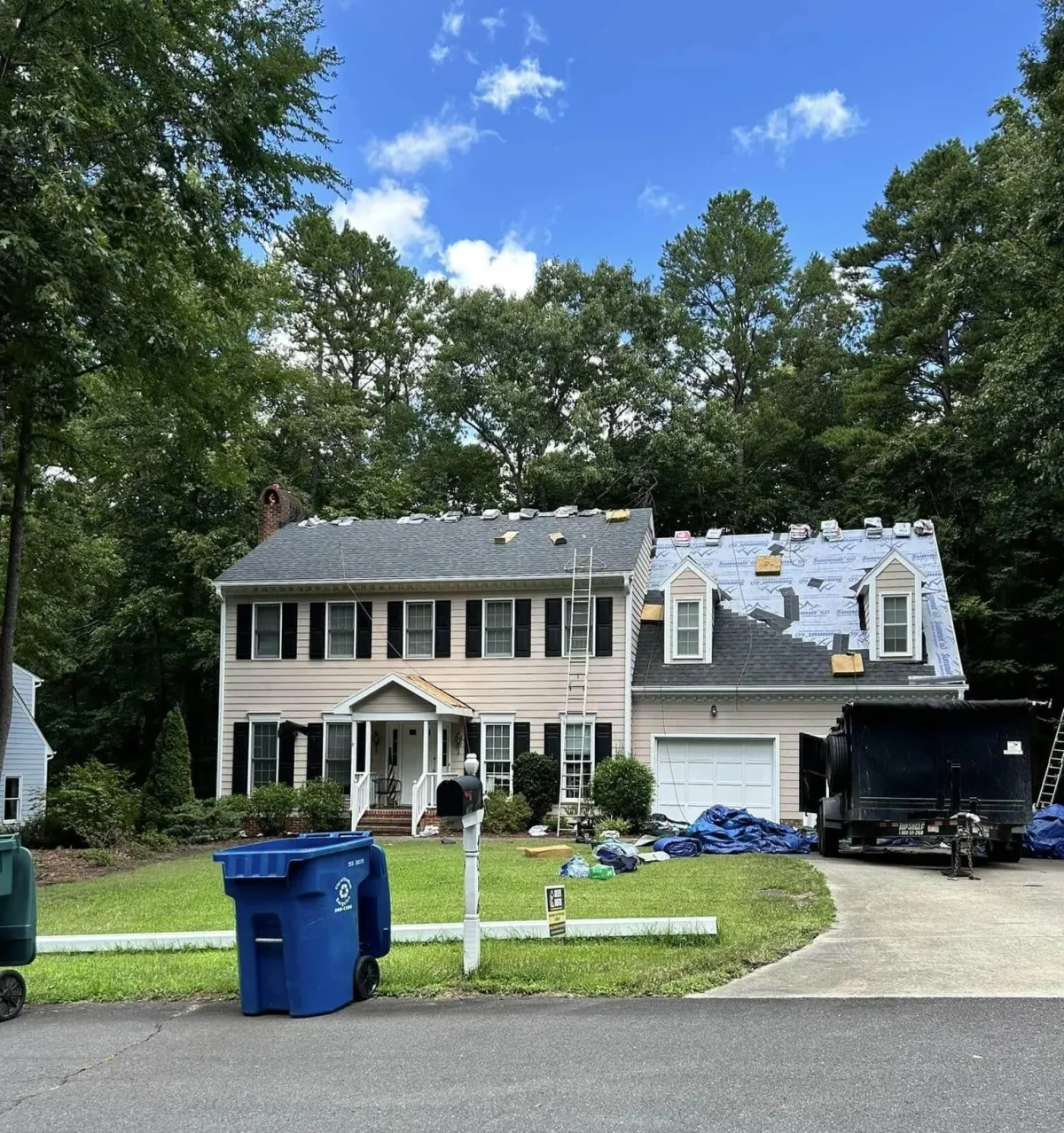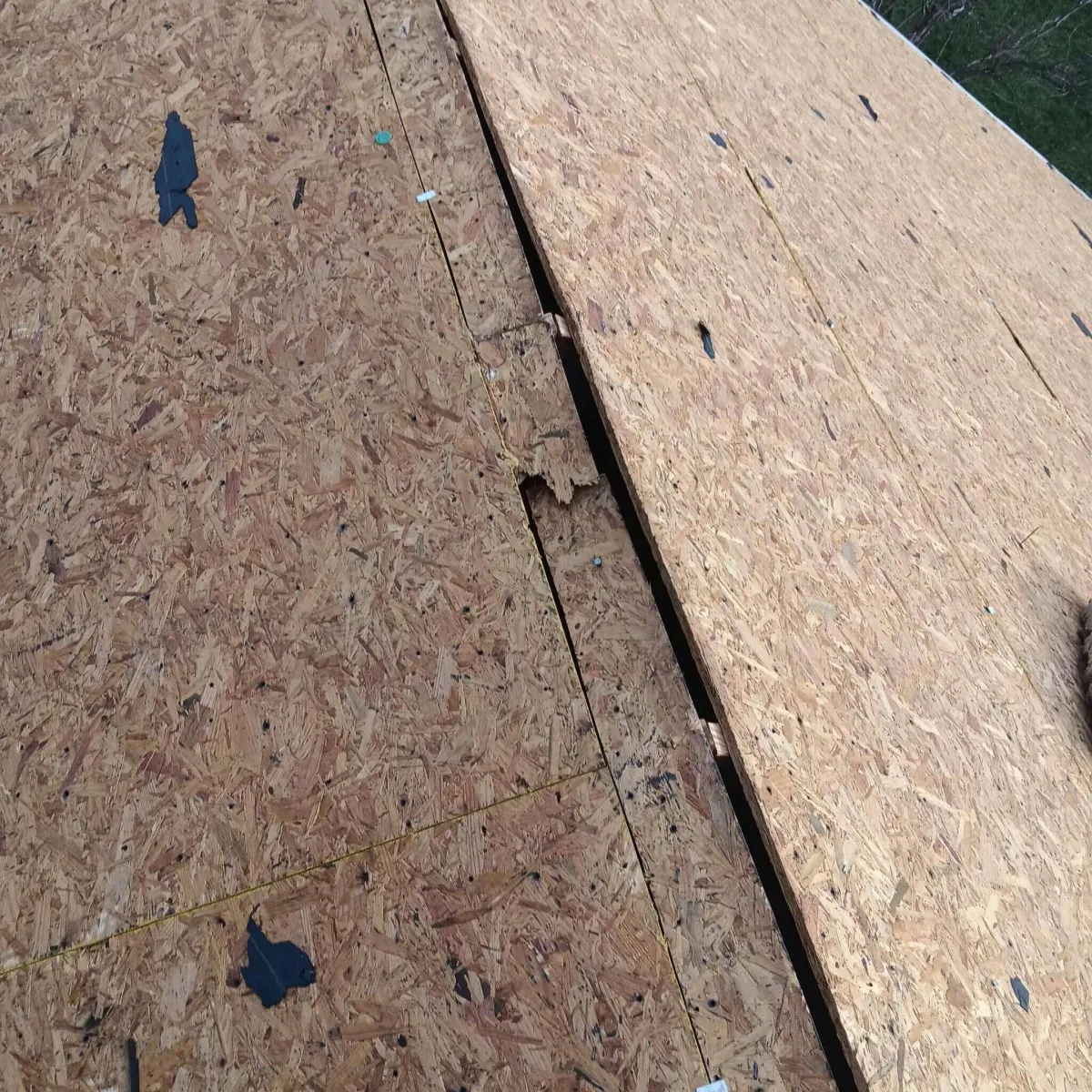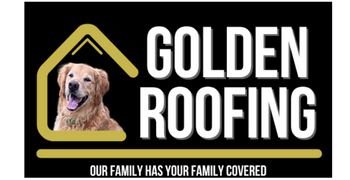


Roof Repairs
Roof Repairs

The Golden Standard In Roof Repairs
Even minor roof damage can lead to major issues if left unaddressed. Leaks may cause water intrusion in your attic and walls, while missing or broken shingles expose your home to wind, rain, and further deterioration. At Golden Roofing, we know time is critical, that’s why we deliver fast, dependable roof repairs that restore both your roof and your peace of mind.
Here’s What You Can Expect from Our Roof Repair Process:
✔ Comprehensive Roof Inspection
Our skilled roofers begin with a full evaluation to pinpoint the source and extent of damage. You’ll receive a clear explanation of the issue and a straightforward plan for repair.
✔ Industry-Leading Materials
We use premium-grade roofing products, including architectural 3-dimensional shingles from Atlas, a trusted brand known for durability and performance. Our team is CertainTeed certified, and all repairs meet or exceed manufacturer standards to ensure long-lasting protection and peace of mind.
✔ Expert Craftsmanship
From shingle replacement to flashing and leak repair, our certified team brings precision and professionalism to every job.
✔ Detailed Cleanup
After the work is complete, we clean the job site thoroughly and perform a final inspection to confirm everything is restored to the orginal condition.
Common Causes of Roof Leaks
Understanding the source of a roof leak is the first step to fixing it right. Here are some of the most frequent culprits behind roof leaks we see:
Damaged or Missing Shingles
High winds, storms, or aging shingles can expose your roof to water intrusion. Even a single missing shingle can lead to a leak.
Worn or Cracked Flashing
Flashing seals roof transitions, like chimneys or skylights. If it’s bent, rusted, or improperly sealed, water can easily find its way in.
Roof Vent Issues
Plumbing vents, attic fans, and other penetrations can leak if the seals around them dry out, crack, or pull away from the roof surface.
Improperly Installed or Aged Pipe Boots
Pipe boots, the rubber collars that seal around plumbing pipes, are common leak sources once they dry out or become brittle.
Clogged Gutters or Downspouts
When water backs up due to gutter clogs, it can seep under your shingles and leak into the attic or walls. Regular maintenance and cleaning can prevent bigger problems.
Cracked or Failing Chimney Cap or Crown
Brickwork and mortar around the chimney can deteriorate over time, allowing water to leak in through the roof or down into your home.
Ice Dams
Ice buildup along the roof edge can trap melting snow behind it, forcing water under the shingles and into the roof deck.
Valley Leaks
Roof valleys, where two roof slopes meet, carry a lot of water. If improperly sealed or clogged with debris, they can leak easily.
Improper Nail Placement or Exposed Nails
Roofing nails driven in the wrong place or left exposed can rust, loosen, or leave holes that become entry points for water.
Old or Failing Underlayment
As your roof ages, the underlayment (a moisture barrier beneath the shingles) can wear out or become compromised, allowing leaks even if shingles appear intact.
Understanding the source of a roof leak is the first step to fixing it right. Here are some of the most frequent culprits behind roof leaks we see:
Understanding the source of a roof leak is the first step to fixing it right. Here are some of the most frequent culprits behind roof leaks we see:
Damaged or Missing Shingles
High winds, storms, or aging shingles can expose your roof to water intrusion. Even a single missing shingle can lead to a leak.
Worn or Cracked Flashing
Flashing seals roof transitions, like chimneys or skylights. If it’s bent, rusted, or improperly sealed, water can easily find its way in.
Roof Vent Issues
Plumbing vents, attic fans, and other penetrations can leak if the seals around them dry out, crack, or pull away from the roof surface.
Improperly Installed or Aged Pipe Boots
Pipe boots, the rubber collars that seal around plumbing pipes, are common leak sources once they dry out or become brittle.
Clogged Gutters or Downspouts
When water backs up due to gutter clogs, it can seep under your shingles and leak into the attic or walls. Regular maintenance and cleaning can prevent bigger problems.
Cracked or Failing Chimney Cap or Crown
Brickwork and mortar around the chimney can deteriorate over time, allowing water to leak in through the roof or down into your home.
Ice Dams
Ice buildup along the roof edge can trap melting snow behind it, forcing water under the shingles and into the roof deck.
Valley Leaks
Roof valleys—where two roof slopes meet—carry a lot of water. If improperly sealed or clogged with debris, they can leak easily.
Improper Nail Placement or Exposed Nails
Roofing nails driven in the wrong place or left exposed can rust, loosen, or leave holes that become entry points for water.
Old or Failing Underlayment
As your roof ages, the underlayment (a moisture barrier beneath the shingles) can wear out or become compromised, allowing leaks even if shingles appear intact.

Knowing When It’s Time to Repair or Replace Your Roof
Not all roof damage looks the same and not all of it requires a full replacement. At Golden Roofing, our experienced team handles a wide variety of roof repair problems with precision and care, including:
Missing or Damaged Shingles
Whether caused by aging materials, storm impact, or poor installation, missing or broken shingles compromise your roof’s protection. We’ll replace or repair them to restore your roof’s integrity.
Roof Leaks
Leaks can start small but lead to serious interior damage. We identify the exact source , whether it’s around chimneys, vents, or skylights and make durable repairs to stop water intrusion fast.
Flashing Failures
Flashing protects vulnerable areas where the roof meets walls or features like skylights and pipes. If it’s cracked or corroded, we’ll repair or replace it to maintain a watertight seal.
Tree and Animal Damage
Overhanging branches can scratch or puncture roofing materials, especially during storms. Squirrels, birds, and other animals may tear through shingles or create small openings that lead to leaks. We repair this damage and offer solutions to help prevent future issues.
Compromised Decking
If the decking beneath your shingles is soft, rotted, or water-damaged, repairs may not be enough. We’ll inspect the underlying wood and recommend full replacement when necessary to restore structural integrity and prevent long-term issues.
Roof Leak Repair FAQ
What are the signs of a roof leak?
Common signs include water stains on ceilings or walls, mold or mildew growth, sagging or discolored drywall, peeling paint or wallpaper, and the sound of dripping during rain. In the attic, you may find wet insulation, visible water stains, or even daylight showing through the roof.
What causes roof leaks?
Roof leaks can be caused by a variety of issues, including missing or damaged shingles, cracked flashing, worn pipe boots, improperly driven nails, clogged gutters, debris buildup in valleys, leaks around chimneys or skylights, and in colder climates, ice damming.
How do I find the source of a roof leak?
Finding the source of a leak isn’t always straightforward. Water can travel along rafters or beams before becoming visible inside the home. Start by checking your attic for wet spots, water stains, or light coming through the roof, and follow the trail back toward the source. A professional inspection is often the safest and most accurate way to locate a leak.
How much does roof leak repair cost?
Repair costs depend on the severity of the leak and the materials involved. Minor repairs might range from $150 to $500, while more complex or widespread damage could cost $1,500 or more. We provide free estimates so you’ll know exactly what to expect.
Can I fix a roof leak myself, or should I call a professional?
Some small, visible leaks—like a missing shingle or minor flashing issue—can sometimes be handled by a skilled homeowner. However, most leaks require a professional roofer, especially when the source is hard to find, the roof is steep or unsafe to access, or there's underlying structural damage.
Will my homeowner’s insurance cover the repair?
Coverage depends on the cause of the leak. Sudden damage from storms, fallen branches, or hail is often covered, while leaks caused by aging materials or lack of maintenance are typically not. It’s best to review your policy or speak with your insurance agent to understand your coverage.
How urgent is it to fix a roof leak?
Very urgent. Even small leaks can lead to mold growth, electrical hazards, and structural deterioration if left unchecked. Delaying repairs can also increase overall costs and lead to more extensive damage.
How can I prevent future roof leaks?
Regular maintenance is key. Inspect your roof at least once a year, clear gutters and downspouts regularly, check flashing around chimneys and vents, and replace damaged shingles promptly. Scheduling annual inspections with a professional can also catch potential problems early.

